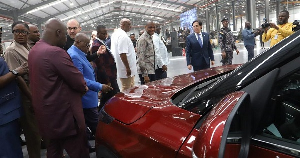Regional News of Thursday, 1 July 2010
Source: GNA
Council of Labour directs workers to wear red bands
Takoradi, July 1, GNA - The Sekondi-Takoradi Metropolitan Council of
Labour on Wednesday directed members of the Ghana Trades Union Congress (GTUC) in the Metropolis to wear red bands to work as the first sign to t he Government that the Union was serious about its resolutions against the recent increases in utilities tariffs. The Metropolitan Council of Labour gave the directive after a second
emergency meeting on the tariffs increases at Takoradi. It advised workers to perform their assigned duties at their workpla ces with all diligence and to ensure industrial peace because the red bands w ere not aimed at their employers. If questioned by their employers, workers should explain the rationa le for wearing the red bands, the Council said. It said workers would continue to wear red bands to work until the Executive Board of the GTUC met on July 8, to decide the next step to tak e to have the tariffs reviewed downward.
In an address read for Mr Kofi Asamoah, Secretary General of the GTU C, he said the Union was not against tariffs increases, but it was against t he growing tendency of Government to announce astronomical increases in tari ffs without taking into account the prevailing low incomes in the country. He said Ghanaians were not worried about by the increase per se but by the magnitude of the increases. "We believe that such sky high increases are bound to impact negativ ely on the already precarious living conditions in the country," Mr Asamoah said, adding "the GTUC believes that increases of this magnitude in a yea r in which the national daily minimum wage was increased by only 17 per cen t and public sector pay increased by only 10 per cent, cannot be justified" .. Mr Asamoah said it smacked of insensitivity for the Public Utility Regulatory Commission (PURC) to ask workers to pay such record level increases in utility tariffs when their real incomes were on the decline. He said there was evidence that some residential users, who were currently on prepaid-meters, were actually experiencing over 150 per cent
increase in their utility tariffs.
Mr Asamoah said this was unjustifiable by all standards and the earl ier the Government intervened to resolve such obvious anomaly, the better it would be. He said astronomical increases in utility tariffs could plunge local
manufacturing industries into major crisis, which might result in shut do wns and lay off of workers and thereby compounding the already huge unemploym ent situation, particularly among the youth. Mr Asamoah said the increase in utility tariffs came on the heels of
the astronomical increases in road tolls which translated into increases in lorry fares and prices of other basic communities.
He said the hike in road tolls was done without any consultations wi th the relevant stakeholders including even those in the road transport industry. Mr Asamoah said the GTUC raised its concerns about the magnitude of the increase and called on the Government to consider a review of the tolls through consultations with the relevant stakeholders in the road transpor t industry, but the Government had not responded to the concerns of the Uni on. 1 July 10










